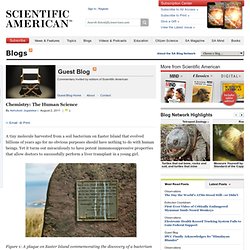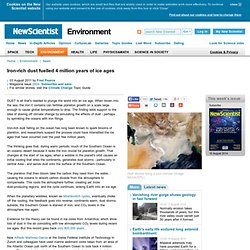

Guest Blog: Chemistry: The Human Science. A tiny molecule harvested from a soil bacterium on Easter Island that evolved billions of years ago for no obvious purposes should have nothing to do with human beings.

Yet it turns out miraculously to have potent immunosuppressive properties that allow doctors to successfully perform a liver transplant in a young girl. Figure 1: A plaque on Easter Island commemorating the discovery of a bacterium producing rapamycin, a potent immunosuppressant. Since its discovery, rapamycin has allowed the successful transplantation of organs into millions of patients (Image credit: Wikipedia) In India, an excited young bride celebrates her upcoming wedding by coloring her hands bright yellow with turmeric, a spice that has been used for centuries as a key culinary ingredient.
In France, a similar hallowed tradition demands a copious flow of red wine at weddings. Iron-rich dust fuelled 4 million years of ice ages - environment - 03 August 2011. DUST is all that's needed to plunge the world into an ice age.

When blown into the sea, the iron it contains can fertilise plankton growth on a scale large enough to cause global temperatures to drop. The finding adds support to the idea of staving off climate change by simulating the effects of dust - perhaps by sprinkling the oceans with iron filings. Iron-rich dust falling on the ocean has long been known to spark blooms of plankton, and researchers suspect the process could have intensified the ice ages that have occurred over the past few million years. The thinking goes that, during warm periods, much of the Southern Ocean is an oceanic desert because it lacks the iron crucial for plankton growth.
That changes at the start of ice ages, when a wobble in the planet's orbit causes an initial cooling that dries the continents, generates dust storms - particularly in central Asia - and sends dust onto the surface of the Southern Ocean.